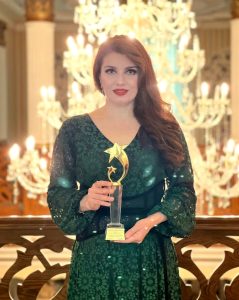Menu
Parisa Arsalani

Biography
Prof. Parisa Arsalani was born in Urmia-Iran.As a master of vocal and traditional Azerbaijani music singing and a soloist of Azerbaijani minstrel music “Saz” in Iran, she won many prizes at national music festivals and music competition as the first grade winner in Iran in 2000.
She was eligible to take the title of “Music Phenomena” in Iran at the same period by merely performing instrumental music in Iran. She was granted the “Golden Saz” prize from Azerbaijan country because of her master level of music performances.
She moved to Baku capital of Azerbaijan to study singing at the Baku State Conservatory and graduated there successfully in 2007.
She also was granted different prizes like:
*** Honor Medal “Sheref Medali” in 2014 – Azerbaijan.
***”Azerbaijan Best Awards” in 2016 & 2017 – Azerbaijan.
***Turkic World Honor Prize, “Türk Dünyası Dostluq Ordeni” in 2017 from Azerbaijan.
***”Diamond Globe Awards” in 2019 – Azerbaijan.
***Special Award of “Hayat Media Awards” in 2020 – Turkey
***”BID International Star Award (ISAQ) ” in 2019 in Gold Category for Quality,
Innovation & Excellence – Geneva, Switzerland.
*** “Global Woman Awards” in 2022- Azerbaijan.
*** “Global Star Awards 2023” – the special honorary award of the year in 2023- Azerbaijan.
*** “Land of Fire Awards” in 2023 – Azerbaijan – 2023.
*** “Honorary Professor Degree” – from the International Academy of Sciences of
Azerbaijan in 2023 – Azerbaijan.
*** “Golden Medal” of the International Academy of Sciences of Azerbaijan in 2023-
Azerbaijan.
She has worldwidely released her first official music album called “Resonance” with a unique and different style in world-music in 2017. Several songs from this album won the Blue – Mark of high quality “Mastered for iTunes” in Apple Music & iTunes. Most of the songs of this album entered the top 100 list of Apple Music & iTunes songs in several countries, including Chile, Canada and Russia. American music journalist Alexandra Ivanoff describes Parisa Arsalani’s singing as: “Parisa Arsalani’s voice is an unparalleled and distinctive one: sonorous, radiant, dolorous, possessing a kaleidoscope of color–the colors of an exotic land, the amber hues of love lost, and the poetry of dreams both realized and unfulfilled. Though still young, her voice speaks like an old soul with roots attached to many previous centuries. Her technical range is extraordinarily wide:
she moves from executing the tricky ululations of Azeri folk idioms to the sultry, bluesy phraseology of the West. The thing that makes her leap out of the crowd in her genre is the clarity of her diction coupled with the extraordinary depth of sound, so that her voluptuous vocalism is capable of projecting both a powerful presence and intimacy at the same time.”

Parisa Arsalani
Singer
A musician of traditional musical instruments of Azerbaijan